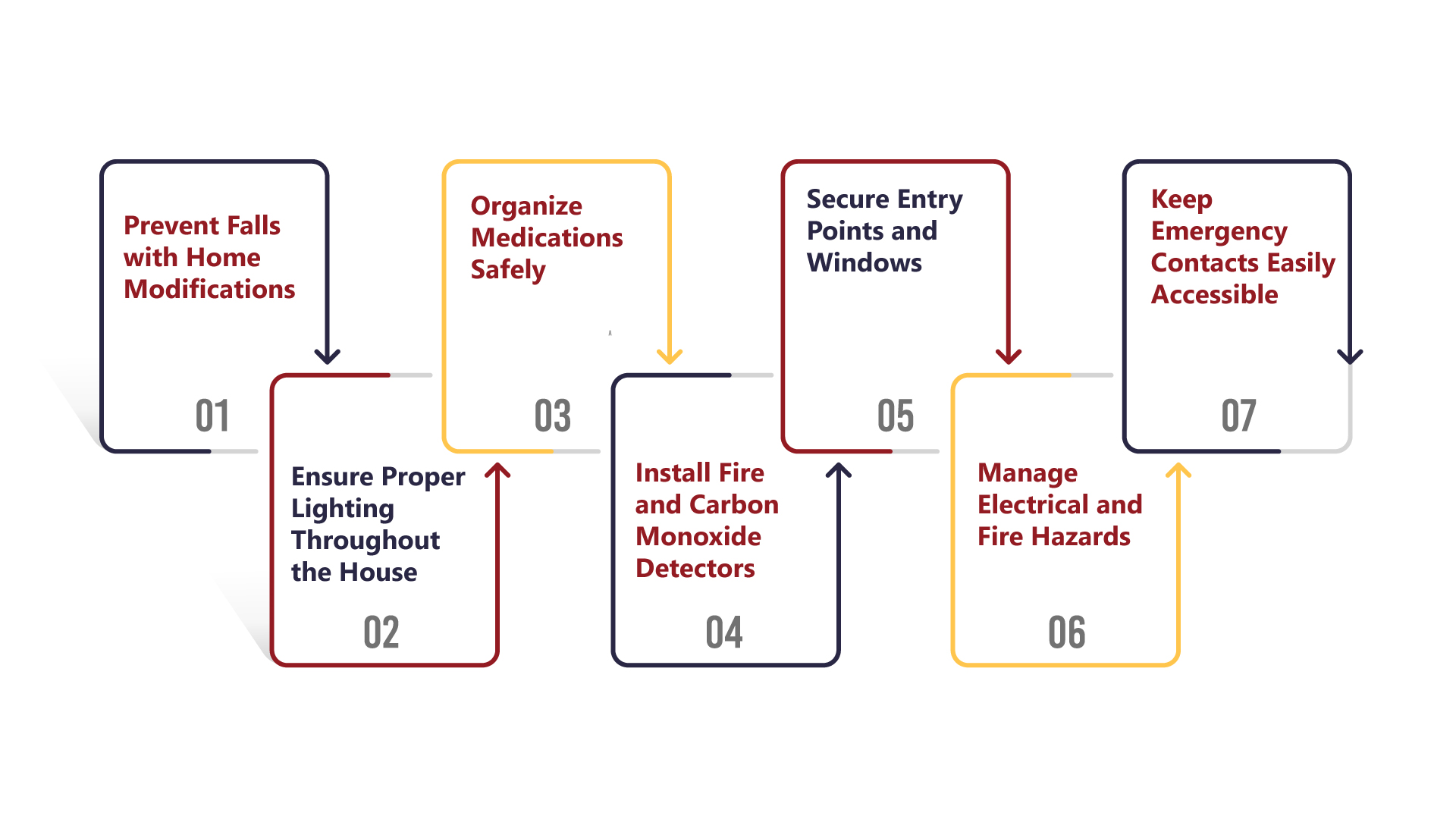Living independently offers seniors a sense of autonomy and dignity. However, with advancing age, there’s an increased risk of accidents at home, ranging from falls to fire hazards. Seniors living alone can take proactive steps to ensure their safety while maintaining independence. Here are seven essential tips to prevent accidents and create a safer living environment.

1. Prevent Falls with Home Modifications
- Falls are one of the most common accidents among seniors. To minimize the risk, consider making home modifications that cater to mobility challenges:
- Install grab bars and handrails in areas like bathrooms, hallways, and stairs to provide stability.
- Use non-slip mats in the bathroom and kitchen, where surfaces can get slippery.
- Ensure that staircases have sturdy railings and proper lighting.
- Declutter walkways by removing loose rugs, electrical cords, or unnecessary furniture to reduce tripping hazards.
- Encourage seniors to wear non-slip footwear inside the home.
These changes, although minor, can significantly reduce the likelihood of falls.
2. Ensure Proper Lighting Throughout the House
- Good lighting plays a critical role in preventing accidents, especially for seniors with impaired vision. To improve visibility:
- Place bright lights in all rooms, hallways, and stairways, particularly areas that are used frequently at night.
- Install motion-sensor lights in key areas like bedrooms, bathrooms, and entrances so seniors don’t have to fumble in the dark.
- Make sure all light switches are easily accessible and installed at a comfortable height
- Use nightlights in bedrooms and bathrooms to provide gentle illumination during nighttime trips.
These lighting improvements ensure that seniors can move around the house safely, even at night.
3. Organize Medications Safely
- Medication management is crucial for seniors, especially those with multiple prescriptions. Proper organization can prevent medication-related accidents such as overdoses or missed doses. Here’s how to stay safe:
- Use clearly labeled pill organizers to ensure medications are taken at the right time and in the correct dosage.
- Set up automatic medication reminders via smartphone apps or devices that alert seniors when it’s time to take their medicine.
- Keep a list of medications and their dosages easily accessible in case of emergencies.
Regular maintenance of these devices is essential for ensuring they function correctly in an emergency.
4. Install Fire and Carbon Monoxide Detectors
- Seniors are at a higher risk of home fires due to cooking accidents or faulty electrical wiring. To minimize this danger:
- Install smoke detectors in every room, especially near the kitchen and bedrooms. Test them monthly and replace batteries regularly.
- Place carbon monoxide detectors near bedrooms and any fuel-burning appliances.
- Develop a fire escape plan with clear routes and practice it with seniors to ensure they know how to exit the house quickly.
- Encourage seniors to use automatic shut-off devices on stoves or ovens to prevent unattended cooking accidents.
Regular maintenance of these devices is essential for ensuring they function correctly in an emergency.
5. Secure Entry Points and Windows
- Home security is another important factor in protecting seniors living alone. To prevent break-ins and ensure peace of mind:
- Install deadbolt locks on all doors and secure all windows with locks.
- Use video doorbells or security cameras to monitor visitors and discourage potential intruders.
- Consider using smart home systems that allow seniors or family members to control and monitor door locks, lighting, and alarms remotely.
- Teach seniors to avoid opening the door to strangers and always check the identity of visitors before letting them in.
By securing entry points, seniors can feel safe and protected in their homes.
6. Manage Electrical and Fire Hazards
- Electrical hazards are often overlooked but can pose a significant risk for seniors. Here are some ways to manage potential dangers:
- Unplug unused appliances and avoid overloading electrical outlets.
- Replace worn-out wires or frayed cords to prevent short circuits and fire hazards.
- Ensure all appliances and heaters are placed away from flammable materials, such as curtains or furniture.
- Encourage seniors to use electric kettles or induction cookers rather than open-flame stoves, which pose a higher fire risk.
Regularly checking electrical systems and appliances for faults or wear can help prevent accidents.
7. Keep Emergency Contacts Easily Accessible
- In case of an emergency, quick access to help is vital. Ensure that seniors have a reliable method of reaching emergency contacts:
- Keep a list of emergency numbers including family members, doctors, and emergency services, posted near the phone or in an easily accessible location.
- Equip seniors with a medical alert device that they can wear around their neck or wrist to call for help in case of an emergency.
- Encourage the use of smartphones with voice-activated dialing or one-touch emergency buttons to make it easier for seniors to reach assistance.
- Ensure that caregivers or family members have access to the home and can respond quickly if needed.
By preparing for emergencies, seniors can feel confident that help is always nearby if an accident occurs.
Conclusion
By taking these proactive steps, seniors living alone can maintain their independence while significantly reducing the risk of accidents. Whether it’s improving home safety, securing entry points, or ensuring medication is managed properly, these tips offer practical solutions to keep seniors safe.At Rushing 2 Your Needs, we provide personalized services to support senior independence, including transportation, in-home care, and safety checks. Our mission is to ensure seniors can live comfortably and securely in their own homes. Contact us today to learn more about how we can help seniors age safely in place.